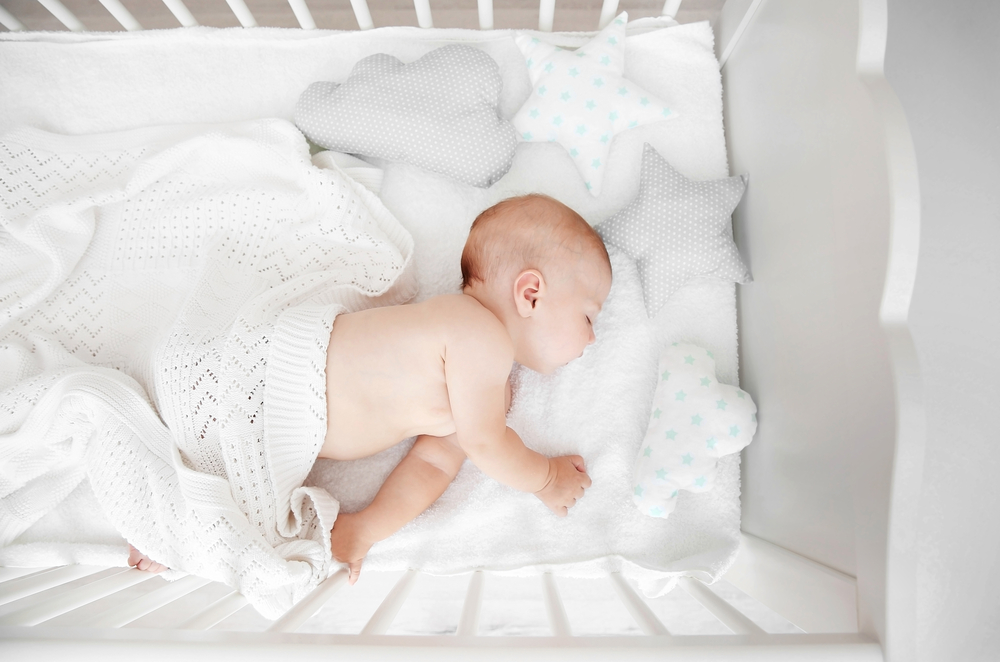The first few weeks are super important for your baby to get familiar and comfortable with their crib. Besides that wonderful skin-to-skin time, your little one should be getting used to sleeping in their own bed without relying on nursing or rocking. Here are some common situations why a baby may not sleep in their crib and how to deal with it.

If your baby only sleeps when held
The main reason why babies prefer to sleep in your arms rather than their bed is because you’re so much more cuddly. They might not like their crib because it’s a sudden transition from your warm embrace to their cold crib. A good trick is to warm up their sheet a little in the dryer and place it on their bed shortly before you put them down. This will help make the transition go more smoothly, especially now that there’s no large difference in temperatures.
Another reason why babies prefer you is that your scent is familiar. You might keep a piece of fabric that you’ve worn tied securely onto the crib side to help comfort your baby. You can also try holding their sheet against your chest and arms before placing it on the crib to make it smell like you.
If your baby is sensitive to outside noise
Ambient noise from the rest of the household or the street could wake your baby up in their crib. In this case, try a white noise machine to play pink, brown, or white noise. Most babies enjoy gentle piano lullabies, which is convenient because the typical white noise machine has a lullaby setting. Other options include nature sounds like whale songs, pattering rain, and whispering winds.

It may seem counterintuitive, but always keep a little bit of ambient noise around when your baby is falling asleep. This way, they don’t get used to total silence when falling asleep, and they will slowly tolerate more and more noise during naps or long stretches of sleep at night.
If your baby likes to comfort nurse
Your little one might like to comfort nurse themselves to sleep. Offer them their thumb as a comfort item instead of their bottle or pacifier. This helps break up the sleep association between food or comfort feeding and falling asleep. When this association is dissolved, even if they wake up in the middle of the night, they won’t need a pacifier or milk to help them fall back asleep. If they’re crying harder than usual, consider outside factors like teething or feeling too cold or hot.
If your baby startles themselves awake
Most babies will wake themselves up because of the startle reflex. To help lessen this phenomenon, purchase a sleep swaddle. This will keep your little one’s arms bundled on their sides and comfortably compressed. There are also specially-shaped pajamas that keep your baby’s arms up in a more natural position.

One more option you might try is a weighted pajama. These provide gentle pressure on your child’s chest to help keep them feel more grounded.
If your baby seems uncomfortable
Lastly, your little one might not like their crib because of other reasons like a dirty diaper, uncomfortable mattress, scratchy clothes, cold or hot room temperature, rough bedsheet, or bright room. Try identifying any of these common problems, and see if your little one has a change of heart.
If not, keep trying and be consistent. Babies thrive with familiarity, and even a bedtime routine might help them get used to their crib. Try a soothing ritual like a warm bath, a relaxing story, and a short lullaby to help them get prepared for sleep. This way, when you follow the routine every night, they’ll soon start expecting the crib with less and less resistance.
We know it’s tough putting them down when you just want to hold them forever, but trust us — you’ll be glad later on. Transitioning your baby from your arms to their crib is tricky. You don’t want to wake them up completely, and you want them to fall asleep without bedtime crutches like comfort nursing or getting rocked to sleep. These nighttime hiccups may seem unbeatable right now, but remember that you’re strong and you’ve got this!
Editors' Recommendations
- The ultimate nursery checklist of everything you need (and nothing you don’t)
- The feeling words all parents should teach their little ones
- When do babies sleep through the night (and what the answer means for your child)?
- How old do you have to be to fly alone? Read this before booking your kid’s trip
- Why you should celebrate your kids’ inchstones


